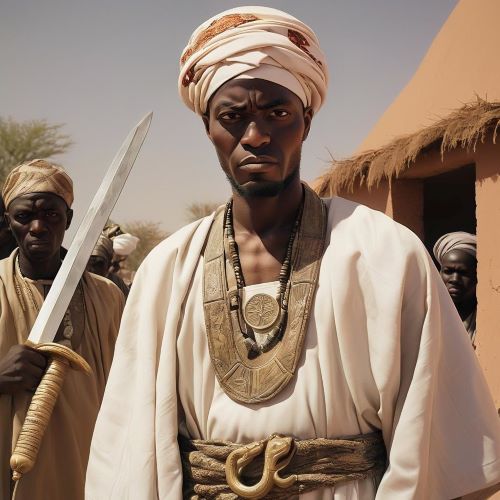Hausa Mortals
Hausa Mortals are central figures in the rich mythology and folklore of the Hausa people, one of the largest ethnic groups in West Africa. These mortal characters often embody the values, virtues, and struggles of the Hausa community, reflecting the deep connection between myth and everyday life. The stories of Hausa Mortals are passed down through generations, blending elements of heroism, moral lessons, and cultural identity, ensuring that the wisdom of the past continues to influence the present.
The legends of Hausa Mortals frequently feature individuals who face significant challenges, whether through battles with supernatural forces, rival factions, or personal conflicts. These mortals are often depicted as heroes, navigating difficult situations with bravery, intelligence, and perseverance. Through their actions, they demonstrate the importance of qualities such as courage, loyalty, and wisdom, which are highly valued in Hausa society. These tales not only entertain but also offer guidance on how to live a virtuous life and uphold the customs and values of the community.
In Hausa mythology, mortals are often depicted as leaders or warriors who must maintain the balance of power and justice within their society. Their journeys may involve interactions with divine beings, spirits, or ancestors, reflecting the interconnectedness between the human and spiritual realms in Hausa culture. These stories emphasize the role of mortals in upholding societal order, ensuring that justice is served, and protecting their people from harm. As such, Hausa Mortals are seen as cultural heroes who represent the ideals of leadership and moral integrity.
While many Hausa Mortals are depicted as heroes, some characters serve as cautionary figures whose actions lead to their downfall due to pride, greed, or a disregard for tradition. These stories highlight the consequences of straying from the community’s moral code and illustrate the importance of humility and responsibility. The dual nature of Hausa Mortal figures, both as heroes and cautionary examples, reflects the complexities of human behavior and the importance of making ethical choices in the face of adversity.
Today, the stories of Hausa Mortals continue to be an integral part of Hausa culture, preserved through oral traditions, storytelling, and cultural ceremonies. These legends are passed down from generation to generation, serving as a means of cultural preservation and a source of inspiration for modern Hausa communities. Whether through traditional songs, poetry, or contemporary art, the legacy of Hausa Mortals remains alive, connecting the past to the present and ensuring that the values and lessons of these mortal characters continue to resonate with future generations.
Hausa Mortals are central figures in the rich mythology and folklore of the Hausa people, one of the largest ethnic groups in West Africa. These mortal characters often embody the values, virtues, and struggles of the Hausa community, reflecting the deep connection between myth and everyday life. The stories of Hausa Mortals are passed down through generations, blending elements of heroism, moral lessons, and cultural identity, ensuring that the wisdom of the past continues to influence the present.
The legends of Hausa Mortals frequently feature individuals who face significant challenges, whether through battles with supernatural forces, rival factions, or personal conflicts. These mortals are often depicted as heroes, navigating difficult situations with bravery, intelligence, and perseverance. Through their actions, they demonstrate the importance of qualities such as courage, loyalty, and wisdom, which are highly valued in Hausa society. These tales not only entertain but also offer guidance on how to live a virtuous life and uphold the customs and values of the community.
In Hausa mythology, mortals are often depicted as leaders or warriors who must maintain the balance of power and justice within their society. Their journeys may involve interactions with divine beings, spirits, or ancestors, reflecting the interconnectedness between the human and spiritual realms in Hausa culture. These stories emphasize the role of mortals in upholding societal order, ensuring that justice is served, and protecting their people from harm. As such, Hausa Mortals are seen as cultural heroes who represent the ideals of leadership and moral integrity.
While many Hausa Mortals are depicted as heroes, some characters serve as cautionary figures whose actions lead to their downfall due to pride, greed, or a disregard for tradition. These stories highlight the consequences of straying from the community’s moral code and illustrate the importance of humility and responsibility. The dual nature of Hausa Mortal figures, both as heroes and cautionary examples, reflects the complexities of human behavior and the importance of making ethical choices in the face of adversity.
Today, the stories of Hausa Mortals continue to be an integral part of Hausa culture, preserved through oral traditions, storytelling, and cultural ceremonies. These legends are passed down from generation to generation, serving as a means of cultural preservation and a source of inspiration for modern Hausa communities. Whether through traditional songs, poetry, or contemporary art, the legacy of Hausa Mortals remains alive, connecting the past to the present and ensuring that the values and lessons of these mortal characters continue to resonate with future generations.

